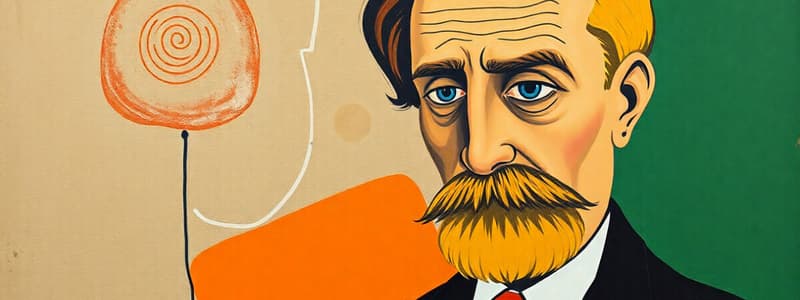Podcast
Questions and Answers
What primary focus does anthropology have?
What primary focus does anthropology have?
- The study of individual behavior and emotions
- The examination of political systems and governance
- The analysis of culture, customs, and human evolution (correct)
- The exploration of social structures and institutions
Which statement accurately differentiates sociology from psychology?
Which statement accurately differentiates sociology from psychology?
- Sociology analyzes governance systems, whereas psychology investigates social structures.
- Sociology is concerned with cognitive functions, while psychology looks at social institutions.
- Sociology examines societal influence on individuals, while psychology studies personal emotions. (correct)
- Sociology studies individual mental processes, while psychology focuses on group behavior.
In what year was the term 'Sociology' coined?
In what year was the term 'Sociology' coined?
- 1893
- 1838 (correct)
- 1905
- 1848
Which key concept is foundational to the study of human societies in sociology?
Which key concept is foundational to the study of human societies in sociology?
Which of the following thinkers is NOT considered influential in the development of sociology?
Which of the following thinkers is NOT considered influential in the development of sociology?
What is the primary focus of sociology?
What is the primary focus of sociology?
Who is considered the father of sociology?
Who is considered the father of sociology?
What concept did Auguste Comte introduce in his writings?
What concept did Auguste Comte introduce in his writings?
What is Karl Marx most known for?
What is Karl Marx most known for?
Which of the following best represents Emile Durkheim's contribution to sociology?
Which of the following best represents Emile Durkheim's contribution to sociology?
What did Marx believe about capitalism and the working class?
What did Marx believe about capitalism and the working class?
What is the law of three stages proposed by Comte?
What is the law of three stages proposed by Comte?
Which of the following works is associated with Emile Durkheim?
Which of the following works is associated with Emile Durkheim?
What key concept did Durkheim argue is essential for understanding individual actions in relation to suicide?
What key concept did Durkheim argue is essential for understanding individual actions in relation to suicide?
What did Weber mean by the term 'Verstehen'?
What did Weber mean by the term 'Verstehen'?
Which of these statements best describes a 'social fact' according to Durkheim?
Which of these statements best describes a 'social fact' according to Durkheim?
Which major work did Weber publish in 1905?
Which major work did Weber publish in 1905?
How did Durkheim's study of suicide contribute to sociological understanding?
How did Durkheim's study of suicide contribute to sociological understanding?
What defines capitalism as an economic system?
What defines capitalism as an economic system?
Which of the following reflects a characteristic of modernity?
Which of the following reflects a characteristic of modernity?
How does sociology primarily differ from anthropology?
How does sociology primarily differ from anthropology?
Flashcards
What is sociology?
What is sociology?
The scientific study of society, its structures, functions, and the relationships between individuals and their communities.
What is positivism in sociology?
What is positivism in sociology?
Auguste Comte introduced the concept of positivism, which emphasized that sociology should be based on observable, scientific facts.
What are Comte's three stages of society?
What are Comte's three stages of society?
Comte's theory that society progresses through three stages: theological, metaphysical, and positive. Each stage reflects a different approach to understanding the world.
What is Marx's theory of class struggle?
What is Marx's theory of class struggle?
Signup and view all the flashcards
What is historical materialism?
What is historical materialism?
Signup and view all the flashcards
What are social facts (Durkheim)?
What are social facts (Durkheim)?
Signup and view all the flashcards
How did Durkheim contribute to sociology?
How did Durkheim contribute to sociology?
Signup and view all the flashcards
What is the division of labor (Durkheim)?
What is the division of labor (Durkheim)?
Signup and view all the flashcards
Anthropology
Anthropology
Signup and view all the flashcards
Sociology
Sociology
Signup and view all the flashcards
Political Science
Political Science
Signup and view all the flashcards
Psychology
Psychology
Signup and view all the flashcards
Culture
Culture
Signup and view all the flashcards
Social Integration
Social Integration
Signup and view all the flashcards
Social Fact
Social Fact
Signup and view all the flashcards
Capitalism
Capitalism
Signup and view all the flashcards
Modernity
Modernity
Signup and view all the flashcards
Verstehen
Verstehen
Signup and view all the flashcards
The Protestant Ethic
The Protestant Ethic
Signup and view all the flashcards
Study Notes
Sociology - The Discipline
- Sociology is the scientific study of society, its structures, functions, and the relationships between individuals and communities.
- It helps understand human behavior, social institutions, how societies evolve, and social relationships, culture, and institutions over time.
- Example: Studying how religion influences family structures or how economic changes affect social behavior.
Thinkers and Their Contributions
Auguste Comte (1798-1857)
- Considered the "father of Sociology."
- Introduced positivism, emphasizing that sociology should be based on observable, scientific facts rather than speculation.
- Developed the law of three stages: theological (belief in divine power), metaphysical (philosophical reasoning), and positive (scientific observation).
- Coined the term "Sociology" in 1838.
- Example: Comte's theory that society evolves like human life, moving from theological to scientific thinking, influencing how we analyze modern social issues.
Karl Marx (1818-1883)
- Introduced the theory of class struggle and historical materialism.
- Argued social change arises from conflicts between the bourgeoisie (owners) and proletariat (workers).
- Emphasized the role of economic structures in shaping society (economy determines political/social systems).
- Published The Communist Manifesto in 1848.
- Example: Marx believed the working class would overthrow capitalism and create a classless society, influencing socialist and communist movements.
Emile Durkheim (1858-1917)
- Established sociology as a distinct academic discipline
- Emphasized the importance of social facts (forces external to individuals influencing behavior).
- Studied social causes of suicide, arguing social integration (feeling part of a group) is key to understanding individual actions.
- Published The Division of Labor in Society in 1893.
- Example: Durkheim's study of suicide showed that highly cohesive societies have lower suicide rates due to support and meaning.
Max Weber (1864-1920)
- Introduced the concept of Verstehen (interpretive understanding of social behavior from the perspective of those involved).
- Explored how religion (particularly Protestantism) influenced the development of capitalism.
- Published The Protestant Ethic and the Spirit of Capitalism in 1905.
- Example: Weber's theory suggests that the Protestant ethic (hard work, frugality, individual responsibility) contributed to the rise of capitalism.
Important Terms and Definitions
- Social Fact: Values, cultural norms, and social structures that transcend individuals, exerting social control over each. Examples include laws, religious beliefs, and marriage customs.
- Capitalism: An economic system with private ownership of production means, focused on profit. Marx argued capitalism exploits workers. Example: Corporations controlling production and workers selling labor.
- Modernity: The historical period with industrial societies, science, rationality, and urbanization; emphasizes individualism and social change. Example: The shift from agrarian to industrial societies in the 18th and 19th centuries.
Sociology vs. Other Social Sciences
- Sociology vs. Anthropology: Sociology focuses on modern societies, while anthropology examines culture, customs and human evolution in non-Western and tribal societies.
- Sociology vs. Political Science: Sociology focuses on social structures and their influence on behavior, while political science analyzes governance, political systems, and power distribution.
- Sociology vs. Psychology: Sociology examines group behavior and social influence, whereas psychology focuses on individual behavior and mental processes.
Key Years in Sociology
- 1838: Auguste Comte coined the term "Sociology."
- 1848: Publication of The Communist Manifesto by Marx and Engels.
- 1893: Emile Durkheim's The Division of Labor in Society.
- 1905: Max Weber's The Protestant Ethic and the Spirit of Capitalism.
Summary of Unit 1
- Sociology, emerging in the 19th century, is influenced by thinkers like Comte, Marx, Durkheim, and Weber.
- It differentiates itself by focusing on social structures, behavior, and institutions
- Key concepts like social facts, capitalism, and modernity lay the groundwork for understanding societal dynamics and their influence on individuals.
Studying That Suits You
Use AI to generate personalized quizzes and flashcards to suit your learning preferences.
Related Documents
Description
This quiz explores the foundational concepts of sociology and key thinkers like Auguste Comte. Learn about the scientific study of society, the evolution of social structures, and the contributions of pivotal figures in sociology. Perfect for anyone looking to deepen their understanding of social dynamics and theories.




